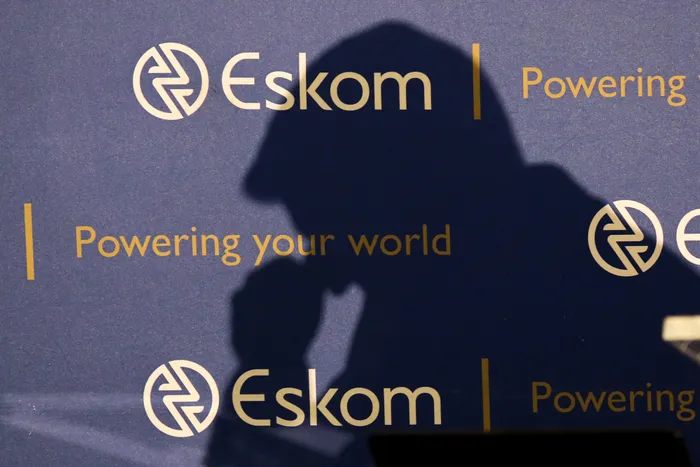Intelligence probe into De Ruyter’s ‘shadow world’ overdue

File Picture: ANA - The shadow of former Eskom Chief Executive André de Ruyter is seen as he speaks at a media briefing in Johannesburg.
By Professor Bheki Mngomezulu
The events of July 2021 which engulfed KwaZulu-Natal and Gauteng raised questions about the strength and capability of our intelligence. These events resulted in deaths, destruction of property and infrastructure, and looting. Significantly, the events dented South Africa’s global image.
While all these developments are worth mentioning, the most concerning negative impact was the image of our country’s intelligence. Even people who are not part of security studies – including those who have never been to school – asked the most pertinent question: was it not possible for the country’s intelligence to have information about the planned violence?
What made this incident more concerning was the fact that even ordinary people knew about it before it happened. Information was shared in the social media space openly for all to see.
So, was it impossible to prevent this incident from happening?
Surely the country learnt hard lessons from the July riots and responded in different ways. From the President’s side, he decided to do three things. First, he removed Ayanda Dlodlo from her position as Minister of State Security. Second, he relocated the ministry to the Presidency. Third, the President appointed an expert panel which was led by Prof. Sandy Africa. The panel was mandated to establish what happened and to produce a report on the civil unrest which engulfed the country but specifically affecting KZN and Gauteng.
The 154-page report dated 21 November 2021 titled “Report of the expert panel into the July 2021 civil unrest” arrived at several conclusions. One of them was that “our analysis suggests that a combination of complex, multi-dimensional, and obscure factors formed the background and led to the outbreak of violence never before seen in our post-apartheid democracy…”
The panel conceded that the report had some limitations. One of them was that its focus was on finding facts, not an inquiry. However, Section 7 of the report presented the findings and made recommendations.
What was noticeable in the report was the first finding which stated that, “Cabinet had been seized with the country’s response to the Covid-19 pandemic as its main priority in the period leading up to the violence.” This implicitly conceded that the government had its focus elsewhere (Covid-19) and did not take seriously the open warnings about the looming unrest. But did this mean that the intelligence had to drop the ball too? Surely not. In July 2022, Sandy Africa wrote a piece titled: “South Africa’s deadly July 2021 riots may recur if there’s no change.” In a way, this analysis did not pour water on the Africa report.
Instead, it considered the identified causal factors and concluded that these had to be addressed to prevent a similar occurrence in the future.
Flowing from the report and the analysis referred to above, these questions arise: how have we as a country capacitated our intelligence beyond just placing the unit in the presidency?
To what extent has the Inspector-General of Intelligence ensured that our intelligence remains on high alert? Has the Joint Standing Committee on Intelligence upped its game in ensuring that the country’s intelligence regains and protects its public image? In other words, are we as a country better now than we were in 2021?
These questions are given impetus by the latest developments in the country. André de Ruyter, the former CEO of Eskom, has published a book, ‘Truth to Power’ which has left many people talking.
While some question the timing of the book’s publication, others are more interested in its contents. At the centre of the debate, which bears relevance to this article, is the missing intelligence report. Appearing before the Standing Committee on Public Accounts (Scopa, Minister of Public Enterprises Pravin Gordhan confirmed having heard about the intelligence report initiated by De Ruyter but denied having seen it.
Addressing members of Parliament, head of the Special Investigating Unit (SIU) advocate Andy Mothibi also confirmed knowledge about the existence of the private intelligence operation report linked to De Ruyter. He, too, stated that the SIU has not been able to get the report.
Now, if the country has an official intelligence unit located in the Presidency, with a Minister, but private individuals can collect their own intelligence, where does that place the image of the country’s intelligence? Can we refute Sandy Africa’s analysis that the country is not out of the woods yet in terms of the state of our intelligence?
Events surrounding De Ruyter and his book implore the Inspector-General of Intelligence and the Joint Standing Committee on intelligence to up their game. They must investigate the claims made by De Ruyter in his book and locate the private intelligence report. Importantly, they must establish how such intelligence was collected outside the national intelligence unit. The image of the country’s intelligence is at stake.
*Prof. Bheki Mngomezulu is Director of the Centre for the Advancement of Non-Racialism and Democracy at the Nelson Mandela University.